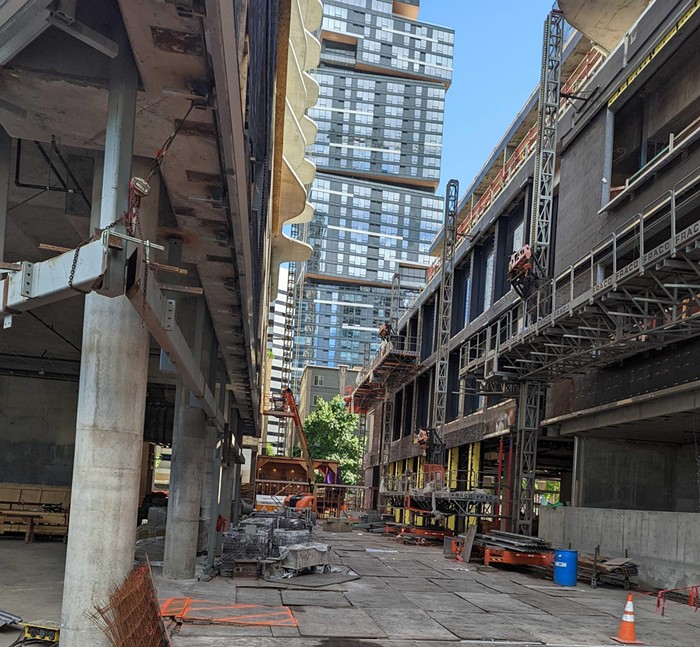
In the 1990s, there was a movement to address what was perceived of as "excessive individualism" in American society. It was called responsive communitarianism (RC), and it had the sociologist Amitai Etzioni as its leading light. His book The Spirit of Community: The Reinvention of American Society (1993) was the movement's bible. As Steven Conn explains in Americans Against the City: Anti-Urbanism in the 20th Century, Etzioni's book blamed the sad state of things in the United States, the lack of sense of community, "the erosion of institutions of community" on "agencies of the liberal state than on the corrosive effect of laissez-faire economics [market fundamentalism]." (My notes and highlights of Conn's book can be seen here.)
In this respect, RC was like all the other major urban movements that followed the failure (or undermining) of the progressive moment in the last decades of the 19th century. The progressives were sober. They understood what was going on around them; they saw in the structure and features of the economy the source of concentrated poverty (slums) in the city. They hated real-estate speculators in much the same way we hate (or are learning to hate, thanks to Bernie Sanders) financial speculators. But after the progressives failed to change the city by changing the economics of the city (breaking with laissez-faire) at the end of the century, all of the proceeding movements in 20th century blamed everything but market-based economics: the character of poor people, or the ugliness of types of architecture, or ethnic strife, or skin color, or the government, or, in the case of RC, the lack of community.
But what is a community? It is a group of people who live together and, more importantly, really support each other. The idea at the center of a community is the communal: the sharing of gains and losses. And so, the community is a family of unrelated people. RC wanted to restore this familial feeling and activity in urban and suburban life. This, they thought, would solve the long urban crisis that began with the destruction of the clear-headed progressive moment.
But here is the problem: A neighborhood of homeowners can never be an actual community. Why? Because those who fail to pay their mortgages lose their place in that neighborhood. What really connects, say, me to others who live on my street is not me as a person or personality but me as one who makes regular and timely payments on my piece of property. If I can't make these payments, my neighbors will not come to my rescue (a community). They will instead worry about the foreclosure harming the value of their homes and things like that. They will be happy (breath freely) only when I'm gone and replaced by someone who pays on time.
But homeowners still want community. They want to be just like one big family on the block. They want that warm feeling that comes with sharing things (lawn mowers, recipes, a pack of beer, values, and so on). But community in this context is nothing more than, has the exact same value and meaning as, a "girlfriend experience."
Let's turn to an interesting passage in a section, "THE GIRLFRIEND EXPERIENCE (AFTER THE GIFT OF TEARS)," of Frédéric Lordon's little masterpiece Willing Slaves of Capital: Spinoza and Marx on Desire:
Winifred Poster reports on the astounding example of Indian workers in the outsourced call centre of a US service company, whose employer does not hesitate to compel them to take on a borrowed American identity in order to better ‘relate’ to clients. Not only must the call centre employees speak English with an American accent and diction, but they also have to develop an interest in regional news (notably sports and the weather) from the part of the US they cover, so as to chat with their customers (they were also advised to watch Friends), and finally they must change their names (an Anil becomes an Arnold)...These Indian employees are giving their American clients a girlfriend experience, which is what a prostitute does to get paid. She must pretend that you, her client, are her boyfriend. The client wants to believe that she is enjoying sex in the same way a person who actually loved or desired him would.
A community in a neighborhood of homeowners can only be a girlfriend experience with this one difference: the homeowner is at once the prostitute (performing) and the client (receiving). Renters, however, can come close to a community because rent is not the same as a mortgage. And often the cheaper the rent is, the nearer the members of a building or a complex come to the state of an actual community. The poorer you are, the more dependent you are on others, and the more likely you are to share gains and losses with others. This was, indeed, the most striking aspect about Yesler Terrace. It had something of a community. And this is why relocating poor or working-class people to mixed-income developments is bound to fail. They need an actual community, and not the unhelpful girlfriend experience of middle-class homeowners.















